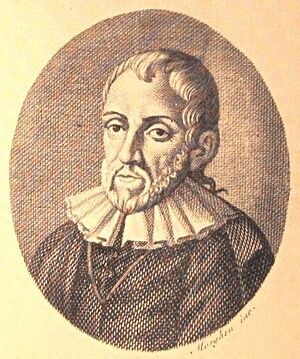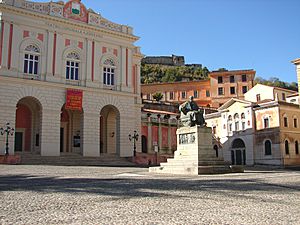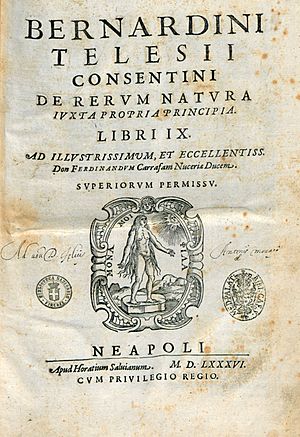Bernardino Telesio facts for kids
Bernardino Telesio (born November 7, 1509 – died October 2, 1588) was an Italian thinker and scientist. Even though some of his ideas about nature were later found to be wrong, he was very important because he believed in learning through observation. This made him one of the first "modern" thinkers who helped create the scientific method.
Contents
Life Story
Bernardino Telesio was born into a noble family in Cosenza, a city in Southern Italy. His uncle, Antonio, who was a famous scholar and poet, taught him in Milan. He also studied in Rome and Padua. Bernardino learned many subjects, including classics, science, and philosophy. This was common for smart people during the Renaissance.
With this knowledge, he started to challenge the old ideas of medieval Aristotelianism that were popular in Padua and Bologna. In 1553, he got married and settled in Cosenza. There, he started the Cosentian Academy, a place for learning and discussion.
In 1565, he published his most important book, De Rerum Natura Iuxta Propria Principia. This means "On the Nature of Things according to their Own Principles." The full version, with nine books, came out in 1586. He also wrote other scientific and philosophical works to support his main ideas.
After his wife died, Pope Pius IV offered him a high position in the Church, but Telesio chose to let his brother Tommaso take it instead. Bernardino spent his last years in Cosenza, leading the "Telesian" Academy.
He died in Cosenza in 1588. He was well-known among scholars and students. However, the Church disagreed with his views because they went against the accepted ideas of Aristotle. Soon after his death, Pope Clement VIII put his books on a list of forbidden books in 1596.
His Ideas on Matter, Heat, and Cold
Telesio had a different way of explaining how things exist. Instead of just matter and form, he thought everything was made of matter and two opposing forces: heat and cold. Heat makes things expand, and cold makes them shrink. He believed these two forces created all the different things we see in the world. The matter itself stayed the same.
He thought that everything develops on its own, but its movement also helps everything else. Some people at the time pointed out problems with his theory. For example, it wasn't clear how so many different things could come from just two forces. Also, he didn't have proof for these forces.
His idea that the Earth was cold and still, and the sun was hot and moving, was later proven wrong by Copernicus. However, his ideas were still very important in Italy. He also suggested that there was no real difference between physics in space and physics on Earth, which was a very forward-thinking idea.
Telesio also believed that matter itself could feel things. He thought that if consciousness exists, it must have come from matter. This led him to a belief that all matter has some kind of life or feeling. He also thought that all knowledge comes from our senses. He believed that our intelligence is just a collection of information gathered by our senses.
To explain how humans can think about God, he added a special "divine soul" given by God. This soul helps us think beyond what our senses can tell us.
Even though Telesio's system had some gaps and missing facts, it was a very important step. It helped lead to all later scientific and philosophical ideas based on observation and experiment. It marked a change from relying on old authorities to using experiments and individual thinking.
Why He Relied on Sensory Data
Telesio led a big movement in Southern Italy that challenged the idea of relying only on abstract reason. He planted the seeds for the scientific methods used by later thinkers like Tommaso Campanella, Giordano Bruno, Francis Bacon, and René Descartes.
He believed that true knowledge comes from what our senses tell us. He wrote in his main book, De Rerum Natura: "The way the world is built, the size of the things in it, and the nature of the world, should not be searched for by reason, as the ancients did, but should be understood by means of observation."
This idea that observation is key is what many modern scholars see as the core of Telesio's philosophy. However, for Telesio, "observation" meant more than just recording facts. It also included thinking about things in a similar way (analogical thought).
While Francis Bacon is often given credit for developing the idea of learning through observation, Telesio was one of the first to suggest that our senses should be the main source of knowledge. Bacon himself called Telesio "the first of the moderns" for putting observation first. However, Bacon also disagreed with many of Telesio's specific theories.
What is most interesting about Telesio's book De rerum natura is his effort to explain as much as possible using simple, mechanical ideas. He tried to explain everything using his theory of matter, heat, and cold. When he talked about humans, he added an instinct for self-preservation to explain why people do things. And when he discussed the human mind's ability to think about things like God, he added a soul. He believed that without a soul, all thoughts would be limited to physical things, and people clearly think about God.
His Books
Besides De Rerum Natura, he also wrote:
- De Somno (On Sleep)
- De his quae in aere fiunt (On Things That Happen in the Air)
- De Mari (On the Sea)
- De Cometis et Circulo Lactea (On Comets and the Milky Way)
- De usu respirationis (On the Use of Respiration)
See also
 In Spanish: Bernardino Telesio para niños
In Spanish: Bernardino Telesio para niños
 | William Lucy |
 | Charles Hayes |
 | Cleveland Robinson |




